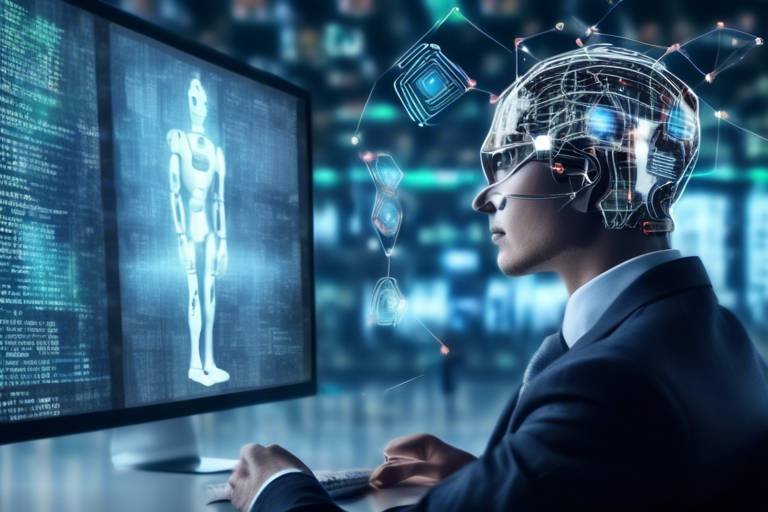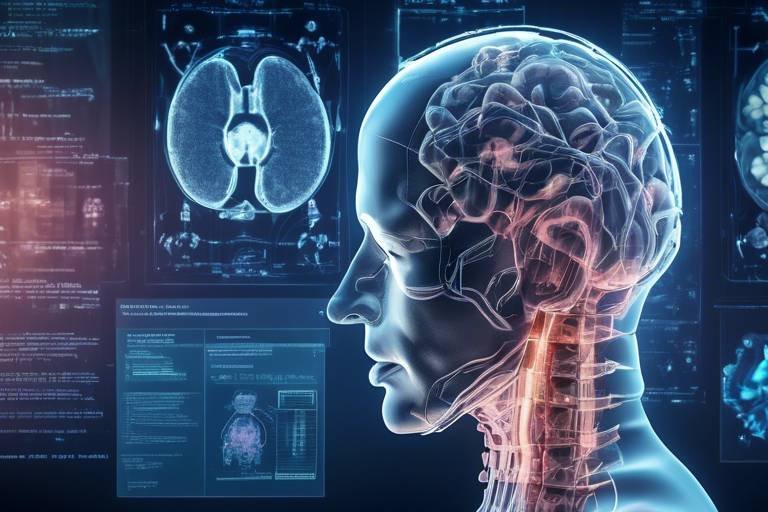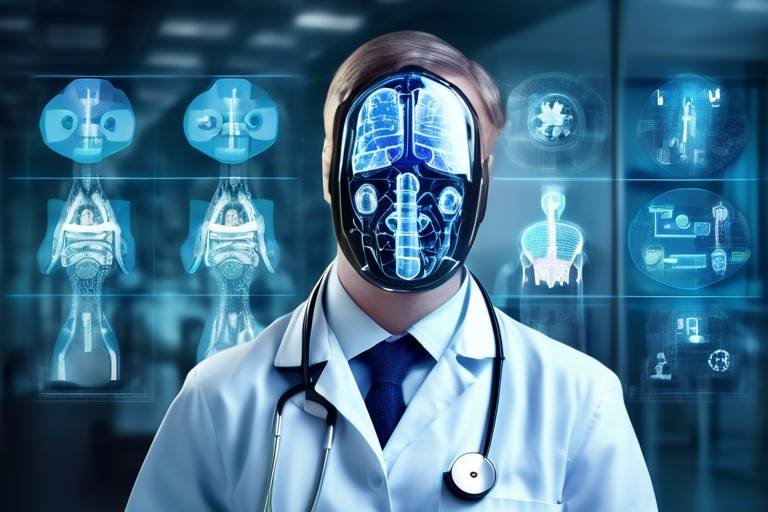The Role of AI in Improving Mental Health Services
In recent years, the landscape of mental health care has undergone a remarkable transformation, largely fueled by advancements in artificial intelligence (AI). This technology is not just a passing trend; it’s reshaping how we approach mental health diagnosis, treatment, and ongoing patient support. Imagine a world where mental health professionals have access to tools that enhance their ability to diagnose conditions accurately, tailor treatments to individual needs, and monitor patient progress in real-time. AI is making this vision a reality, offering a new frontier in mental health services that is both exciting and promising.
As we delve deeper into the role of AI in mental health care, it’s essential to recognize the multifaceted benefits it brings. From enhancing the accuracy of diagnoses to providing personalized treatment plans, AI is proving to be a game-changer. However, it’s not without its challenges. Ethical considerations surrounding data privacy and bias are critical as we navigate this evolving landscape. In this article, we will explore how AI is revolutionizing mental health services, the benefits it offers, and the ethical implications that must be addressed to ensure responsible implementation.
So, how exactly is AI transforming mental health care? Let’s break it down. First, AI tools are making significant strides in diagnosis and assessment. Traditional methods often rely heavily on subjective evaluations, but AI leverages data analysis and predictive algorithms to enhance early detection of mental health conditions. By analyzing patterns in patient data, these tools can flag potential issues that might otherwise go unnoticed, allowing for timely intervention.
Furthermore, the ability to create personalized treatment plans is another remarkable aspect of AI in mental health. Imagine being able to receive a treatment plan that is specifically designed for you, taking into account your unique history, preferences, and responses to previous therapies. This level of customization not only improves the efficacy of treatments but also increases patient engagement, making individuals feel more invested in their mental health journeys.
As we look to the future, the integration of AI in teletherapy platforms enhances accessibility, allowing patients to receive immediate support and resources at their fingertips. This is particularly crucial in a world where mental health issues are on the rise, and access to traditional therapy can be limited. AI-powered monitoring systems enable therapists to manage larger caseloads effectively, ensuring that no patient feels overlooked.
In conclusion, while the potential of AI in mental health services is vast, we must also tread carefully, ensuring that ethical considerations are at the forefront of this technological evolution. As we continue to explore the myriad ways AI can enhance mental health care, it is vital to remain vigilant about the implications of data privacy and bias. The journey ahead is filled with promise, and with responsible implementation, AI can indeed be a powerful ally in the quest for better mental health outcomes.
- How is AI being used in mental health care? AI is used in mental health care for diagnosis, creating personalized treatment plans, and real-time patient monitoring.
- What are the benefits of using AI in mental health services? The benefits include improved diagnosis accuracy, personalized treatment, and enhanced accessibility to care.
- Are there ethical concerns associated with AI in mental health? Yes, concerns include data privacy, security, and the potential for bias in AI models.
- Can AI replace mental health professionals? AI is a tool to assist professionals, not a replacement. The human element of care remains essential.

AI in Diagnosis and Assessment
Artificial intelligence is making waves in the field of mental health care, particularly in the area of diagnosis and assessment. Imagine a world where mental health conditions can be identified with the precision of a well-tuned instrument. AI tools are revolutionizing this aspect by analyzing vast amounts of data and utilizing predictive algorithms to enhance early detection. This isn't just a small step; it's a giant leap for mental health professionals and patients alike.
Traditionally, diagnosing mental health issues has relied heavily on subjective assessments and clinical interviews. While these methods are valuable, they can sometimes lead to misdiagnosis or delayed treatment. With AI, we are entering an era where data-driven insights can significantly improve the accuracy of diagnoses. By analyzing patterns in patient data—such as behavioral trends, speech patterns, and even social media activity—AI can provide a more comprehensive view of a patient’s mental health status.
For instance, consider the following benefits of AI in diagnosis:
- Enhanced Accuracy: AI algorithms can process more information than a human clinician, reducing the chances of oversight.
- Early Detection: By identifying subtle changes in behavior or mood, AI can flag potential issues before they escalate.
- Standardization: AI can help standardize assessments across different healthcare providers, ensuring consistent care.
One of the most exciting developments is the use of machine learning algorithms. These algorithms are designed to learn from data, improving their accuracy over time. They can analyze historical data from a wide range of patients, identifying factors that contribute to mental health issues. For example, if a patient has a family history of depression, the AI can weigh that information heavily in its assessment. This personalized approach not only enhances diagnosis but also helps in crafting tailored treatment plans.
Moreover, AI tools can also assist in monitoring patient progress. Imagine receiving real-time updates about a patient's condition based on their interactions with an app or their responses during therapy sessions. This level of monitoring allows mental health professionals to make informed decisions quickly, adjusting treatment plans as necessary. It’s like having a digital assistant that never sleeps, always ready to provide insights that can lead to better patient outcomes.
However, while the promise of AI in diagnosis and assessment is immense, it is crucial to approach these advancements with caution. The accuracy of AI tools is heavily dependent on the quality of the data fed into them. If the data is biased or incomplete, the outcomes could be misleading. Therefore, continuous efforts are needed to ensure that AI systems are trained on diverse and representative data sets.
As we look to the future, the integration of AI in mental health diagnosis and assessment is not just a trend; it’s a transformative movement that holds the potential to reshape how we understand and treat mental health conditions. By harnessing the power of technology, we can pave the way for a more effective, efficient, and empathetic mental health care system.
- How does AI improve the accuracy of mental health diagnoses?
AI analyzes vast amounts of data and identifies patterns that may not be visible to human clinicians, leading to more accurate assessments. - Can AI replace mental health professionals?
No, AI is designed to assist and enhance the capabilities of mental health professionals, not replace them. The human element of care remains irreplaceable. - What are the ethical concerns surrounding AI in mental health?
Concerns include data privacy, potential biases in AI algorithms, and the need for human oversight in treatment decisions.

Personalized Treatment Plans
The landscape of mental health care is undergoing a remarkable transformation, and at the heart of this change lies the concept of . Imagine walking into a clinic and instead of receiving a one-size-fits-all approach, you're presented with a treatment strategy that feels uniquely designed for you. This is the magic of artificial intelligence (AI) in mental health. By leveraging advanced algorithms and vast data repositories, AI is paving the way for customized treatment options that cater to the individual needs of patients.
One of the most exciting aspects of AI in personalized treatment is its ability to analyze a patient's unique profile, including their history, symptoms, and even genetic makeup. This data-driven approach allows mental health professionals to craft treatment plans that are not only more effective but also more engaging for patients. When patients feel that their treatment is tailored specifically to them, they are more likely to be invested in their mental health journey, leading to better outcomes.
To illustrate this point, consider the following key elements that contribute to the development of personalized treatment plans:
- Patient History: AI systems can analyze a patient's medical history, identifying previous treatments and their outcomes, which helps in formulating a plan that builds on past experiences.
- Symptom Analysis: By evaluating current symptoms through various data points, AI can suggest interventions that target the most pressing issues faced by the patient.
- Behavioral Patterns: AI tools can track patient behavior over time, identifying patterns that may indicate how they respond to different therapies.
Furthermore, the integration of machine learning algorithms enhances the personalization of treatment plans. These algorithms can predict how patients might respond to specific therapies based on their unique data profiles. For instance, if a patient has previously shown a positive response to cognitive behavioral therapy (CBT), AI can recommend continuing with CBT while also suggesting complementary therapies that have worked for similar patients.
AI-powered patient monitoring systems also play a crucial role in this personalized approach. By continuously tracking a patient's progress through real-time data analysis, mental health professionals can make timely adjustments to treatment plans. This not only ensures that the treatment remains effective but also empowers patients by involving them in their own care decisions.
In summary, the advent of personalized treatment plans through AI is revolutionizing mental health care. It not only enhances the efficacy of therapies but also fosters a deeper connection between patients and their treatment. As we look to the future, the potential for AI to further refine these plans is immense, promising a more responsive and individualized approach to mental health care.
Q: How does AI create personalized treatment plans?
A: AI analyzes a patient's medical history, current symptoms, and behavioral patterns to develop a treatment strategy tailored specifically for them.
Q: Can personalized treatment plans improve patient outcomes?
A: Yes, personalized treatment plans increase patient engagement and are more likely to address individual needs, leading to better mental health outcomes.
Q: What role do monitoring systems play in personalized treatment?
A: AI-powered monitoring systems track patient progress in real-time, allowing for timely adjustments to treatment plans based on ongoing data analysis.

Data-Driven Insights
In the rapidly evolving landscape of mental health care, have emerged as a game changer. Imagine having access to a treasure trove of information that not only reveals patterns in mental health conditions but also guides clinicians in making informed decisions. This is precisely what AI brings to the table. By harnessing vast amounts of data, AI can identify trends and correlations that might be invisible to the naked eye. For instance, through analyzing patient histories, treatment outcomes, and even social media activity, AI algorithms can uncover critical insights that inform treatment strategies.
One of the most exciting aspects of leveraging data in mental health care is the ability to create personalized treatment plans. By analyzing data from similar cases, AI can suggest tailored interventions that are more likely to resonate with individual patients. This means that instead of a one-size-fits-all approach, patients receive care that is specifically designed to meet their unique needs. Think of it like a tailor crafting a suit; the more precise the measurements, the better the fit. In this case, the measurements are the data points collected from various sources.
Furthermore, the integration of predictive analytics plays a crucial role in enhancing patient outcomes. AI systems can analyze historical data to forecast how a patient might respond to specific therapies. For example, if a patient has a history of anxiety but shows a positive response to cognitive behavioral therapy (CBT), AI can recommend CBT as the preferred treatment option. This predictive capability not only boosts the efficacy of therapies but also enhances patient engagement, as individuals feel more involved in their mental health journey.
As we delve deeper into the realm of data-driven insights, it’s essential to recognize the importance of continuous monitoring. AI-powered systems can track patient progress in real-time, allowing mental health professionals to adjust treatment plans based on ongoing data analysis. This dynamic approach ensures that care is not static but evolves with the patient's needs. For instance, if a patient starts to show signs of distress, AI can alert the clinician, prompting timely interventions that could prevent a crisis.
To illustrate the impact of data-driven insights, consider the following table showcasing some key benefits:
| Benefit | Description |
|---|---|
| Enhanced Diagnosis | AI analyzes data to identify mental health conditions with greater accuracy. |
| Personalized Treatment | Custom treatment plans based on individual patient data and responses. |
| Predictive Analytics | Forecasting treatment outcomes to optimize patient care. |
| Real-Time Monitoring | Continuous tracking of patient progress for timely adjustments. |
In conclusion, data-driven insights powered by AI are revolutionizing the mental health landscape. They provide a roadmap for clinicians to navigate the complexities of mental health care, ensuring that patients receive the most effective and personalized treatment possible. This approach not only enhances the quality of care but also empowers patients to take an active role in their mental health journeys. As we continue to explore the potential of AI in mental health, the possibilities for improved outcomes and patient satisfaction are truly exciting.
- What are data-driven insights in mental health? Data-driven insights refer to the analysis of vast amounts of data to identify patterns and trends that inform treatment strategies and enhance patient care.
- How does AI personalize treatment plans? AI analyzes individual patient data and historical cases to recommend tailored interventions that are more likely to be effective for specific patients.
- Can AI help in predicting treatment outcomes? Yes, AI utilizes predictive analytics to forecast how a patient might respond to different therapies based on historical data.
- What is the role of real-time monitoring in mental health care? Real-time monitoring allows clinicians to track patient progress continuously, enabling timely adjustments to treatment plans as needed.

Machine Learning Algorithms
When we talk about in the context of mental health care, we are venturing into a realm that combines technology with human understanding in a truly groundbreaking way. Imagine having a tool that can sift through mountains of patient data, recognizing patterns and predicting outcomes with remarkable accuracy. That's the power of machine learning! These algorithms analyze various data points, such as patient history, treatment responses, and even genetic information, to forecast how individuals might respond to different therapeutic approaches.
One of the most exciting aspects of machine learning algorithms is their ability to continuously learn and adapt. Just like a seasoned therapist who refines their techniques based on patient feedback, these algorithms improve their predictions over time. This means that the more data they process, the better they become at tailoring treatments to individual needs. For instance, if a patient responds well to a particular type of therapy, the algorithm can suggest similar approaches for future patients with comparable profiles. This not only enhances the efficacy of treatments but also empowers patients to take an active role in their mental health journey.
Moreover, machine learning algorithms can also help identify risk factors for mental health conditions. By analyzing data from various sources, including social media activity, wearable devices, and health records, these algorithms can flag potential issues before they escalate. This proactive approach is akin to having a personal health coach who nudges you to take action when necessary. For example, if an algorithm detects a pattern indicating increased anxiety levels in a patient, it can alert their healthcare provider to intervene early, potentially preventing a crisis.
To illustrate the impact of machine learning in mental health, consider the following table that summarizes key benefits:
| Benefit | Description |
|---|---|
| Personalization | Creates tailored treatment plans based on individual data. |
| Predictive Analytics | Forecasts patient responses to various therapies. |
| Early Intervention | Identifies risk factors for mental health issues before they escalate. |
| Continuous Learning | Improves predictions and recommendations over time. |
In essence, machine learning algorithms are not just tools; they are partners in the mental health care journey. They assist clinicians in making more informed decisions, ultimately leading to better patient outcomes. As we continue to harness the power of these technologies, we can look forward to a future where mental health care is not only more effective but also more accessible to those in need.
- What are machine learning algorithms?
Machine learning algorithms are computational models that analyze data to identify patterns and make predictions based on that data.
- How do these algorithms improve mental health treatment?
They provide personalized treatment recommendations, predict patient responses, and allow for early intervention based on data analysis.
- Are there any risks associated with using machine learning in mental health?
Yes, concerns include data privacy, potential biases in the algorithms, and the need for human oversight in treatment decisions.
- Can machine learning replace mental health professionals?
No, machine learning is meant to assist professionals, not replace them. The human element of care remains irreplaceable.

Patient Monitoring Systems
In the realm of mental health, powered by artificial intelligence are becoming essential tools that enhance the quality of care. Imagine having a personal assistant that tracks your mental health journey, providing insights and support whenever you need it. These systems are designed to monitor patients' progress in real-time, allowing mental health professionals to intervene promptly when necessary. This capability is particularly crucial for individuals dealing with conditions such as depression, anxiety, or bipolar disorder, where fluctuations in mood can occur rapidly.
One of the most significant advantages of AI-driven monitoring systems is their ability to analyze vast amounts of data. By collecting information from various sources—such as wearable devices, mobile apps, and even social media—these systems can identify patterns that may indicate changes in a patient's mental state. For instance, if a patient's sleep patterns change or their activity levels drop significantly, the system can alert healthcare providers to these shifts, facilitating timely interventions. This proactive approach transforms the traditional model of mental health care, which often relies on periodic check-ins, into a more dynamic and responsive framework.
Moreover, these systems can enhance patient engagement by providing users with real-time feedback on their mental health. Imagine receiving notifications on your phone that encourage you to practice mindfulness or remind you to take your medication. This constant connection can empower patients to take an active role in their treatment, fostering a sense of control over their mental well-being. Additionally, the data collected can be used to tailor treatment plans specifically to the individual's needs, ensuring that therapy is not a one-size-fits-all solution.
However, while the benefits of patient monitoring systems are clear, it is essential to approach their implementation with caution. Data privacy is a significant concern, as these systems often handle sensitive personal information. Ensuring that this data is secure and used ethically is paramount. Patients must feel confident that their information is protected and that it will not be misused. This is where transparency becomes vital; healthcare providers using these systems should communicate clearly about how data is collected, stored, and utilized.
In summary, AI-powered patient monitoring systems represent a transformative advancement in mental health care. By providing real-time insights and fostering patient engagement, they not only improve treatment outcomes but also create a more personalized experience for individuals seeking help. As we continue to explore the integration of AI in mental health services, it is crucial to balance innovation with ethical considerations, ensuring that these powerful tools are used responsibly and effectively.
- What are patient monitoring systems?
They are AI-driven tools that track and analyze patients' mental health progress in real-time, allowing for timely interventions and personalized care. - How do these systems enhance patient engagement?
By providing real-time feedback and reminders, they empower patients to take an active role in their mental health journey. - What are the privacy concerns associated with AI in mental health?
The handling of sensitive personal data raises concerns about confidentiality and potential misuse, making data security a top priority. - Can these systems predict mental health crises?
Yes, by analyzing patterns and changes in data, they can alert healthcare providers to potential crises, allowing for timely intervention.

Teletherapy and AI Integration
In today's fast-paced world, teletherapy has emerged as a beacon of hope for individuals seeking mental health support. The integration of artificial intelligence (AI) into teletherapy platforms is not just a trend; it's a transformative shift that is reshaping how therapy is delivered. Imagine being able to connect with a therapist from the comfort of your home, all while benefiting from cutting-edge AI technology that enhances your therapy experience. This integration allows for immediate access to mental health resources, making it easier than ever for individuals to seek help when they need it most.
One of the most significant advantages of AI in teletherapy is its ability to provide real-time support. AI-powered chatbots and virtual assistants can offer immediate responses to user inquiries, guiding them through initial assessments or helping them find the right resources. For instance, when someone is feeling overwhelmed, they can interact with an AI tool that understands their emotional state and suggests coping strategies or connects them to a licensed therapist. This kind of instantaneous support can be a game-changer, especially for those who may hesitate to reach out for help.
Moreover, AI enhances the efficiency of therapists by enabling them to manage larger caseloads effectively. With AI handling administrative tasks such as scheduling, reminders, and even preliminary assessments, therapists can dedicate more time to actual therapy sessions. This not only improves the quality of care but also reduces the waiting time for patients seeking appointments. The result? A more streamlined process that benefits both therapists and patients alike.
However, it's essential to recognize that while AI can augment teletherapy, it does not replace the human touch that is so critical in mental health care. The therapeutic relationship built on trust and empathy is irreplaceable. AI serves as a tool that supports therapists, allowing them to focus on what they do best—helping their clients navigate their mental health challenges.
Furthermore, the data collected through AI integration can provide valuable insights into patient progress. By analyzing patterns in patient interactions and feedback, AI can help therapists tailor their approaches based on what works best for each individual. This data-driven approach not only enhances the treatment experience but also fosters a deeper understanding of mental health trends and outcomes.
In summary, the integration of AI into teletherapy is revolutionizing mental health services by providing immediate support, enhancing therapist efficiency, and offering data-driven insights. As we continue to embrace this technological advancement, we must also ensure that the human element of care remains at the forefront, creating a balanced approach that prioritizes both innovation and empathy.
- What is teletherapy? Teletherapy is a form of therapy conducted over digital platforms, allowing individuals to connect with therapists remotely.
- How does AI improve teletherapy? AI enhances teletherapy by providing real-time support, streamlining administrative tasks, and offering data-driven insights into patient progress.
- Can AI replace therapists? No, AI cannot replace therapists; it serves as a supportive tool to enhance the therapy experience while maintaining the essential human connection.
- Is teletherapy as effective as in-person therapy? Research indicates that teletherapy can be as effective as in-person therapy for many individuals, especially when combined with AI tools.

Ethical Considerations in AI Use
The rapid integration of artificial intelligence (AI) into mental health services brings forth a plethora of benefits, but it also raises significant ethical considerations that cannot be overlooked. As we embrace technology to enhance mental health care, we must ask ourselves: how do we maintain the integrity of patient care while leveraging AI's capabilities? One of the foremost concerns is data privacy and security. With AI systems often requiring access to sensitive personal information, the risk of data breaches looms large. Patients need to feel confident that their information is safeguarded against unauthorized access and misuse.
Moreover, the question of bias and fairness in AI models is critical. AI systems are trained on vast datasets, which may inadvertently include biases reflective of societal inequalities. For instance, if an AI model is trained predominantly on data from a specific demographic, it may not perform well for individuals from diverse backgrounds. This can lead to misdiagnoses or inappropriate treatment recommendations. Therefore, it is essential for developers to implement strategies that ensure the creation of fair and equitable AI models, actively working to eliminate biases and promote inclusivity in mental health care.
Another ethical aspect to consider is the human element of care. While AI can enhance diagnostic accuracy and treatment efficiency, it cannot replace the empathy and understanding that a human therapist provides. Mental health care is deeply personal, often requiring a nuanced approach that AI may struggle to replicate. Thus, integrating AI into mental health services should not diminish the role of human therapists; rather, it should support them, allowing for a more collaborative approach to patient care.
To address these ethical considerations effectively, mental health organizations and AI developers must work together to establish comprehensive guidelines and best practices. This could include:
- Regular audits of AI systems to assess bias and accuracy
- Implementing robust data protection measures
- Training AI on diverse datasets to improve fairness
- Ensuring transparency in AI decision-making processes
By prioritizing these ethical considerations, we can harness the power of AI to improve mental health services while maintaining the trust and safety of those we aim to help. The future of mental health care is bright, but it requires a careful balance between innovation and ethical responsibility.
- What are the main ethical concerns regarding AI in mental health?
The primary concerns include data privacy, potential biases in AI models, and the importance of maintaining the human element in care. - How can we ensure data privacy in AI systems?
Implementing strong data protection measures and regularly auditing AI systems can help safeguard sensitive patient information. - What role does bias play in AI mental health applications?
Bias can lead to misdiagnoses and inappropriate treatments, making it crucial to train AI on diverse datasets and actively work to eliminate biases. - Can AI replace human therapists?
No, AI should enhance the role of human therapists, providing support and improving efficiency while preserving the essential human connection in mental health care.

Data Privacy and Security
In the realm of mental health services, have become paramount concerns as we increasingly integrate artificial intelligence into treatment and diagnosis. With AI systems relying heavily on personal and sensitive patient information, the stakes are high. Imagine sharing your deepest fears and struggles, only to find out that your data is not as secure as you thought. This reality raises significant questions about how we protect individuals' privacy while still harnessing the benefits of AI.
First and foremost, it's crucial to understand that mental health data is particularly sensitive. It includes not just demographic information, but also personal histories, treatment plans, and even real-time updates on a patient's mental state. Therefore, the potential for data breaches poses a serious risk not just to individual patients, but to the integrity of mental health care as a whole. To mitigate these risks, organizations must implement robust security frameworks and protocols. Some key measures include:
- Encryption: Ensuring that all data is encrypted both in transit and at rest can significantly reduce the risk of unauthorized access.
- Access Controls: Implementing strict access controls ensures that only authorized personnel can view sensitive data, minimizing the risk of internal breaches.
- Regular Audits: Conducting regular security audits helps identify vulnerabilities in the system, allowing for timely updates and improvements.
Moreover, patients must be informed about how their data will be used. Transparency is key in building trust between patients and mental health providers. Patients should be given clear information about:
- What data is collected
- How it will be used
- Who has access to it
- What measures are in place to protect their information
In addition, the ethical use of AI in mental health care necessitates ongoing discussions about consent. Patients should have the right to opt-in or opt-out of data collection practices, ensuring they feel comfortable and secure in their treatment environment. The challenge lies in balancing the need for comprehensive data to improve AI algorithms with the necessity of safeguarding individual privacy.
As we look to the future, the integration of AI in mental health services presents both exciting opportunities and significant challenges. By prioritizing data privacy and security, we can pave the way for a more responsible and effective use of AI in mental health care, ultimately leading to better outcomes for patients. The conversation around these issues is ongoing, and it is essential for stakeholders in the mental health field to remain vigilant and proactive in addressing them.
- What measures are in place to ensure data privacy in AI mental health services?
Organizations typically implement encryption, access controls, and regular audits to protect sensitive data. - How can patients ensure their data is secure?
Patients should inquire about data handling practices and their rights regarding consent and access to information. - What happens if there is a data breach?
Organizations are required to notify affected individuals and take steps to mitigate the breach's impact, including improving security measures.

Bias and Fairness in AI Models
As we dive deeper into the realm of artificial intelligence in mental health, one of the most pressing issues that emerges is bias. Imagine you're at a restaurant, and the server keeps recommending dishes that cater only to a specific taste. This is similar to how AI systems can sometimes be trained on data that reflects only a limited perspective, leading to skewed outcomes. In the context of mental health, this can mean that certain populations may not receive the care they need because the AI models fail to recognize their unique challenges and experiences.
AI systems learn from historical data, and if that data contains biases—whether related to race, gender, socioeconomic status, or other factors—the AI can inadvertently perpetuate these biases in its recommendations and assessments. This can result in a lack of fairness in treatment options, where some patients receive more attention and better resources than others. It's crucial to recognize that mental health care should be equitable and accessible to everyone, regardless of their background.
To combat these challenges, ongoing efforts must focus on creating fair and equitable AI models. This involves several key strategies:
- Diverse Data Sources: Using a wide range of data that reflects various demographics and experiences can help reduce bias.
- Regular Audits: Continually assessing AI models for bias and making necessary adjustments is essential to ensure fairness.
- Inclusive Development Teams: Having diverse teams involved in the development of AI systems can bring different perspectives that help identify potential biases.
Moreover, transparency plays a vital role in addressing bias in AI. When patients and mental health professionals understand how AI systems make decisions, they can better evaluate the outcomes and challenge any unfair practices. It's like having a clear window into the kitchen of that restaurant—knowing how dishes are prepared can lead to better choices and trust in what you're being served.
In conclusion, while AI has the potential to revolutionize mental health care, we must remain vigilant about the biases that can arise within these systems. Ensuring fairness in AI models is not just a technical challenge; it's a moral imperative. By prioritizing equity and transparency, we can work towards a future where AI serves as a tool for inclusivity and understanding, ultimately improving mental health services for all.
- What is AI bias? AI bias occurs when an AI system produces results that are systematically prejudiced due to flawed assumptions in the machine learning process.
- How can bias in AI be reduced? Bias can be reduced by using diverse datasets, conducting regular audits of AI systems, and involving diverse teams in the development process.
- Why is fairness important in mental health AI? Fairness ensures that all individuals receive equitable treatment and support, which is crucial for effective mental health care.

The Future of AI in Mental Health
The future of AI in mental health services is not just a distant dream; it's unfolding before our eyes, promising a revolution in how we approach mental health care. Imagine a world where mental health professionals are equipped with powerful AI tools that can predict patient needs even before they articulate them. This is not science fiction; this is the trajectory we are on. The integration of AI into mental health care is expected to enhance accessibility, improve treatment modalities, and open doors to groundbreaking research that could fundamentally change our understanding of mental health conditions.
One of the most exciting prospects is the potential for enhanced accessibility. AI-driven platforms can provide support to individuals in remote areas where mental health resources are scarce. With just a smartphone, patients can access AI chatbots that offer immediate assistance, helping to bridge the gap between traditional therapy sessions. This means that no one has to feel alone in their struggle, as support is just a click away. Furthermore, AI can facilitate group therapy sessions, allowing individuals to connect with others facing similar challenges, fostering a sense of community and shared experience.
Moreover, the development of personalized treatment modalities is on the horizon. AI systems can analyze a patient's unique history, preferences, and responses to various treatments, creating a tailored approach that maximizes effectiveness. This is akin to having a personal coach who knows your strengths and weaknesses and tailors a game plan just for you. With continuous learning capabilities, AI can adapt treatment plans in real-time, ensuring that patients receive the most relevant and effective care throughout their journey.
As we look toward the future, we also see the potential for groundbreaking research in understanding mental health conditions. AI can sift through mountains of data, uncovering patterns and correlations that human researchers might overlook. This could lead to new insights into the causes of mental health disorders, paving the way for innovative treatments and preventive measures. For instance, by analyzing genetic data, lifestyle choices, and environmental factors, AI might help identify at-risk individuals before symptoms manifest, allowing for early intervention.
However, it is crucial to approach this future with caution. The integration of AI in mental health care must be accompanied by robust ethical frameworks to address concerns surrounding data privacy, bias, and the essential human element of care. We must ensure that while we harness the power of AI, we do not lose sight of the compassion and understanding that are vital in mental health treatment.
- What role does AI play in mental health diagnosis? AI enhances diagnostic accuracy by analyzing data and identifying patterns that may not be evident to human practitioners.
- Can AI provide therapy? While AI can offer support and resources, it is not a substitute for human therapists. AI can complement traditional therapy by providing additional tools and insights.
- How does AI ensure patient privacy? AI systems must adhere to strict data privacy regulations and employ advanced security measures to protect sensitive patient information.
- What are the ethical concerns surrounding AI in mental health? Concerns include data privacy, potential biases in AI algorithms, and the need to maintain the human touch in mental health care.
Frequently Asked Questions
- How is AI improving the diagnosis of mental health conditions?
AI is transforming the diagnosis process by utilizing advanced data analysis and predictive algorithms. These technologies can analyze vast amounts of patient data to identify patterns that may indicate mental health issues, leading to more accurate and timely diagnoses.
- What are personalized treatment plans, and how does AI contribute to them?
Personalized treatment plans are customized approaches tailored to meet the specific needs of each patient. AI contributes to this by analyzing individual patient data, preferences, and responses to past treatments, allowing mental health professionals to design more effective and engaging therapy strategies.
- Can AI assist in monitoring patient progress?
Absolutely! AI-powered monitoring systems can track a patient's progress in real-time. This continuous data analysis enables healthcare providers to make timely adjustments to treatment plans, ensuring that patients receive the support they need when they need it.
- What role does AI play in teletherapy?
AI enhances teletherapy platforms by improving accessibility and convenience. It provides patients with immediate support and resources, while also helping therapists manage larger caseloads efficiently, making mental health care more reachable for everyone.
- What ethical concerns are associated with the use of AI in mental health services?
There are several ethical concerns, including data privacy and security, potential biases in AI models, and the importance of maintaining the human element in care. It's crucial to ensure that AI systems are designed to protect patient information and serve diverse populations fairly.
- How does AI ensure data privacy and security?
AI systems must implement robust security measures to protect sensitive patient data. This includes encryption, secure access protocols, and regular audits to prevent breaches and ensure that personal information is handled responsibly.
- What is the future of AI in mental health services?
The future looks bright! AI has the potential to further enhance accessibility to mental health care, develop innovative treatment modalities, and facilitate groundbreaking research that can deepen our understanding of mental health conditions.



















